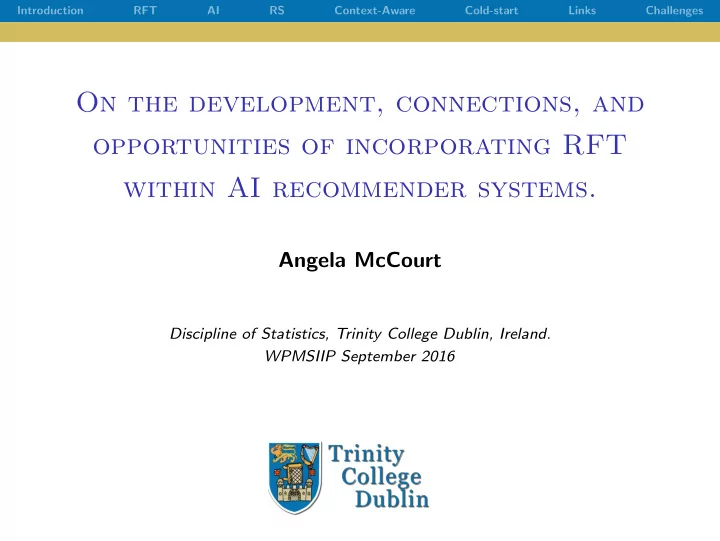

Introduction RFT AI RS Context-Aware Cold-start Links Challenges On the development, connections, and opportunities of incorporating RFT within AI recommender systems. Angela McCourt Discipline of Statistics, Trinity College Dublin, Ireland. WPMSIIP September 2016
Introduction RFT AI RS Context-Aware Cold-start Links Challenges Introduction • Relational Frame Theory • AI as a data source form Recommender Systems • Classic and Context-aware Recommender Systems • Cold-start problems • Linking concepts from psychology to AI & Recommender Systems.
Introduction RFT AI RS Context-Aware Cold-start Links Challenges Relational Frame Theory : Taken from: https://foxylearning.com/tutorials/rft/3/4422-1008
Introduction RFT AI RS Context-Aware Cold-start Links Challenges Relational Frame Theory • Mutual Entailment C rel { A r x B ||| B r y A } • Combinatorial Entailment C rel { A r x B and B r y C ||| A r p C and C r q A } • Transformation of Function C func [ C rel A r x B and B r y C { Af 1 ||| Bf 2 r p and Cf 3 r q } ]
Introduction RFT AI RS Context-Aware Cold-start Links Challenges Derived Relations : The Simpsons: Trained and Derived Relations
Introduction RFT AI RS Context-Aware Cold-start Links Challenges Derived Relations For n ≥ 2 , n ∈ Z , trained relations we get n 2 derived relations. X 1 Trained → X 2 Trained → X 3 . . . Trained → X n Trained → X n +1 − − − − − − − − − − − − − − − − So we have: 2( n )+2( n − 1)+2( n − 2)+ . . . +2( n − ( n − 2))+2( n − ( n − 1)) − ( n ) = 2 ( n + n + . . . + n ) � − 2(1 + 2 + . . . + ( n − 1)) − n = � �� n times 2 n 2 − 2 � n − 1 i =1 i − n = 2 n 2 − 2( ( n − 1)( n ) ) − n = 2 2 n 2 − ( n 2 − n ) − n = 2 n 2 − n 2 + n − n = n 2
Introduction RFT AI RS Context-Aware Cold-start Links Challenges Artificial Intelligence • “artificial intelligence is the science of making machines do things that would require intelligence if done by man”. Marvin Minskey (1961) • We can think of AI as the knowledge basis that underlies a RS • Social Knowledge Source • Personal Knowledge Source • Context Knowledge Source
Introduction RFT AI RS Context-Aware Cold-start Links Challenges Recommender Systems • “More Formally, the recommendation problem can formulated as follows: Let C be the set of all users and let S be the set of all possible items that can be recommended. Let u be a utility function that measures the usefulness of item s to user c , that is, u : C × S → R ,where R is a totally ordered set. Then, for each user c ∈ C , we want to choose such item s ′ ∈ S that maximizes the users utility. More formally: s ′ ∀ c ∈ C , c = arg max s ∈ S u ( c , s ) . ” (Adomavicius 2005)
Introduction RFT AI RS Context-Aware Cold-start Links Challenges Types of Recommender Systems • Context-based • Recommends items that are similar to those preferred by the user in the past. • Collaborative • Recommends items that people with similar preferences have liked in the past. • Hybrid • A combination of context-based and collaborative approaches.
Introduction RFT AI RS Context-Aware Cold-start Links Challenges Context-Aware Recommender Systems • Taking context into account. • What is context? • How does context affect our decision-making processes? • This approach normally includes an additional parameter(s) to classic RSs. • Elicitation. • Explicit elicitation. • Implicit elicitation.
Introduction RFT AI RS Context-Aware Cold-start Links Challenges Cold-Start Problem • Two types of cold-start problems: • New-user cold-start where there is no data available for a new user. • New-item cold-start problem where there is no rating information for a new item.
Introduction RFT AI RS Context-Aware Cold-start Links Challenges Linking RFT to Recommender Systems There is already a number of researchers that try to incorporate concepts from psychology into recommender systems and machine learning. • Social Choice Theory (Li & Tang, 2016). • AI teaching AI (Ammar et al. 2014).
Introduction RFT AI RS Context-Aware Cold-start Links Challenges Challenges of incorporating derived relations • How can we incorporate the derived relations when the strength of the relation is not clear? • There may be very little data available, sometimes no data at all. • How can we elicit information about context? • Computational time is very important.
Introduction RFT AI RS Context-Aware Cold-start Links Challenges • My question: How would a mathematical model of uncertainty, ignorance or vagueness help and be incorporated here?
Recommend
More recommend